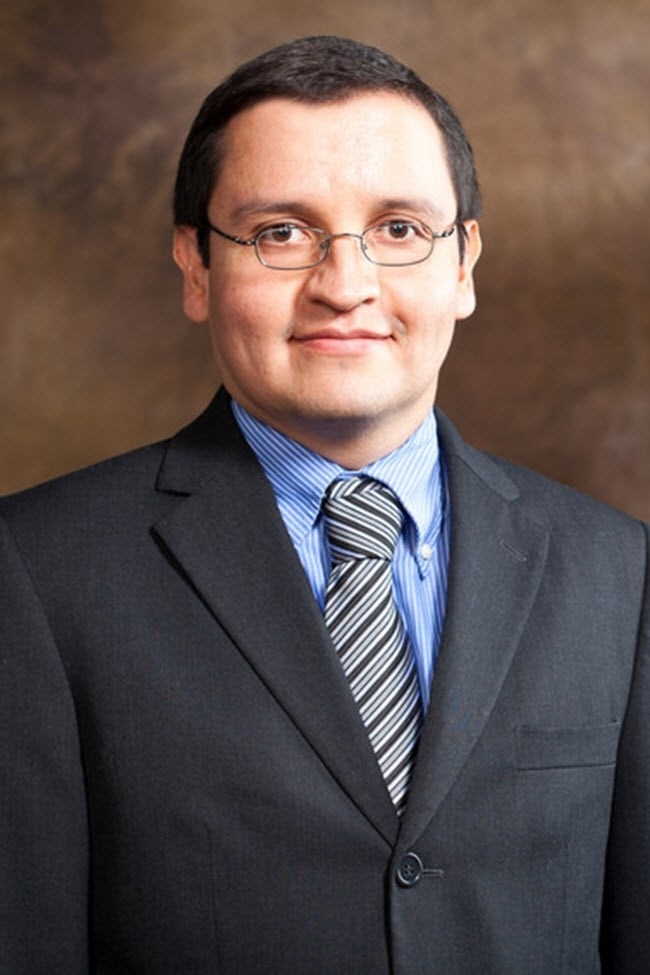Physicists Discover New Two-Dimensional Material
University of Arkansas scientists are part of an international team that has discovered a two-dimensional ferroelectric material just two atoms thick.
Two-dimensional materials are ultrathin membranes that hold promise for novel optoelectronic, thermal, and mechanical applications, including ultra-thin data-storage devices that would be both foldable and information dense.
Ferroelectric materials are those with an intrinsic dipole moment — a measure of the separation of positive and negative charges — that can be switched by an electric field, said U of A associate professor of physics Salvador Barraza-Lopez. "For example, a single water molecule has an intrinsic electron dipole moment as well, but the thermal motion of individual water molecules under ordinary conditions (for instance, in a water bottle) prevents the creation of an intrinsic dipole moment over macroscopic distances."
There has been a vigorous push by researchers to deploy atomically thin, two-dimensional ferroelectrics in the past five years, he said. The new material discovered by the team, a tin selenide monolayer, is only the third two-dimensional ferroelectric belonging to the chemical family of group-IV monochalcogenides that has been experimentally grown thus far. In addition to U of A scientists, the team included researchers from the Max Planck Institute for Microstucture Physics in Germany and the Beijing Academy of Quantum Information Sciences in China. The discovery was described in a paper published in the journal Nano Letters.
Using a scanning tunneling microscope, researchers switched the electron dipole moment of tin selenide monolayers grown on a graphitic substrate. Calculations performed by U of A graduate student Brandon Miller verified a highly oriented growth of this material on such substrate.
The experimental deployment of these materials helps corroborate theoretical predictions underlying truly novel physical behavior. For example, these semiconducting ferroelectric materials undergo phase transitions induced by temperature in which their intrinsic electric dipole is quenched (individual intrinsic electric dipoles fluctuate like they do in water); they also host non-linear optical effects that could be useful for ultra-compact optoelectronics applications.
Work at Arkansas was funded by an Early Career Grant to Barraza-Lopez from the U.S. Department of Energy, Office of Basic Energy Sciences. Calculations were performed on the Trestles system at the Arkansas High Performance Computing Center, funded by grants from the National Science Foundation, the Arkansas Economic Development Commission and the Office of the Vice Provost for Research and Innovation. Calculations were also performed on the Cori system at the National Energy Research Scientific Computer Center. Experimental collaborators include Kai Chang, Felix Küster, Jing-Rong Ji, Jia-Lu Zhang, Paolo Sessi and Stuart S. P. Parkin.
Topics
Contacts
Salvador Barraza-Lopez, associate professor
Department of Physics
479-575-5933,
sbarraza@uark.edu
Bob Whitby, feature writer
University Relations
479-575-4737,
whitby@uark.edu
Headlines
PetSmart CEO J.K. Symancyk to Speak at Walton College Commencement
J.K. Symancyk is an alumnus of the Sam M. Walton College of Business and serves on the Dean’s Executive Advisory Board.
Faulkner Center, Arkansas PBS Partner to Screen Documentary 'Gospel'
The Faulkner Performing Arts Center will host a screening of Gospel, a documentary exploring the origin of Black spirituality through sermon and song, in partnership with Arkansas PBS at 7:30 p.m. Thursday, May 2.
UAPD Officers Mills and Edwards Honored With New Roles
Veterans of the U of A Police Department, Matt Mills has been promoted to assistant chief, and Crandall Edwards has been promoted to administrative captain.
Community Design Center's Greenway Urbanism Project Wins LIV Hospitality Design Award
"Greenway Urbanism" is one of six urban strategies proposed under the Framework Plan for Cherokee Village, a project that received funding through an Our Town grant from the National Endowment for the Arts.
Spring Bike Drive Refurbishes Old Bikes for New Students
All donated bikes will be given to Pedal It Forward, a local nonprofit that will refurbish your bike and return it to the U of A campus to be gifted to a student in need. Hundreds of students have already benefited.





